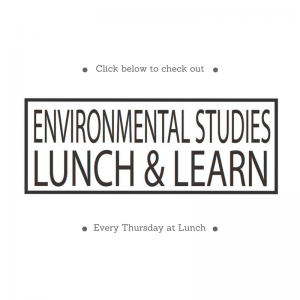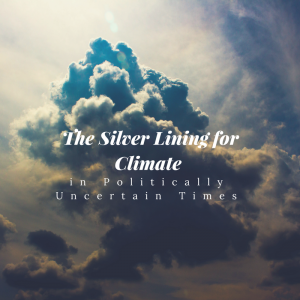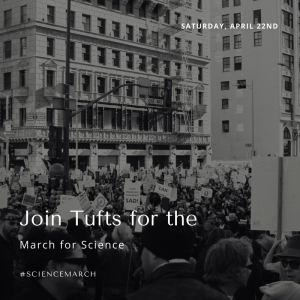Content based on the 150th Environmental Studies Lunch and Learn given to professors, staff, and students at Tufts University. Every week during the academic year, the Lunch & Learn lecture series features speakers from government, industry, academia and non-profit organizations to give presentations on environmental topics. This is a great opportunity to broaden your knowledge beyond the curriculum, meet other faculty and students and network with the speakers.
Students, faculty, staff, and members of the community are welcome to attend this lecture series, which is co-sponsored by the Tufts Institute of the Environment and the Tisch College of Civic Life.
Climate Strategy During the Trump Years
Kenneth Kimmell, President, Union of Concerned ScientistsThe presidency of Donald Trump poses significant uncertainty about the extent to which the United States will continue to make progress on addressing climate change. Ken Kimmell will explore how the incoming administration might rollback policies that have been put in place to address climate change, and make it more difficult for future administrations to address the issue. He will also discuss the progress that is being made in states and regions of the country and the improving economics of clean energy. He will highlight the strategies that the Union of Concerned Scientists and others are likely to employ to limit the damage to our climate objectives and build upon the progress that is being made.
Like many of us, Ken Kimmell, the president of the Union of Concerned Scientists (UCS)—a leading science-based nonprofit that combines the knowledge and influence of the scientific community with the passion of concerned citizens to build a healthy planet and a safer world—see the “dark cloud” surrounding the new political climate; however, Mr. Kimmell is hopeful that its “silver lining” will come in the form of positive change from the people.
In his talk at Alumnae Lounge this March, Ken discussed the darkness in terms of threatened democracy and a “very confused citizenry.” The new administration has been riddled by what Mr. Kimmell refers to as a “factless presidency,” upheld by “alternative facts” and dominated by the belief that climate change is a hoax. Meanwhile, Congress is increasingly captive to special interests that wish to deregulate industries and thwart protection of the environment and human health. And, every day an increasing amount of fake news is published in the media, leading the public to lose trust in the institutions of media, government, and academia to try to “separate fact from fiction.”
At the same time, climate change continues to be a reality faced by many. The Paris Agreement, a global agreement between 197 signatory countries to address and reduce climate change, makes ambitious goals for the U.S. Kimmell explains that this agreement has not been ratified through the Senate and with the new administration’s determination to repeal and prevent climate policy, it will be a great challenge to meet the goals set by the Paris agreement. The administration’s “scorched earth” tactics to dismantle comprehensive climate policy create a long lasting impact on the viability of climate policy. These tactics work hand-in-hand with the government’s “censorship of science” to created what Mr. Kimmell refers to as “Climate Denial 3.0,” in which people do not argue whether or not climate change exists, but instead feel that this determination and proceeding action cannot be made before further “debate and dialogue.” There is a real possibility more funding will be granted to the fringe theories in this “continuing debate,” creating propaganda that sows doubt instead of producing policy upheld by over 20 years of federally-collected data on climate change.
While it may seem a bleak future for the climate movement, Kimmell sees a silver lining in “opportunities to resist, build power, broaden the environmental movement, and revitalize it.” He observes that with “lightning speed, resistance is forming.” People are ready and organizing to mobilize, protect, and expose injustice in changes to federal policy. He also sees the court room as a safety net built into our government, as its decisions and actions are based in factual evidence for actions taken. While the federal government is lagging behind in climate leadership, many cities and states are taking initiative to create climate strategies and goals for increased reliance on renewable energy, clean energy job creation, carbon pricing, cap and trade, zoning codes for smart growth, diversion of food waste, and investment in public transport.
With all this to contend with, what can we do as residents, citizens, students, and academics? Kimmell advises us to lead by example within our institutions, mentioning as an example UCS’s recent divestment from fossil fuels. Another way to make change is to join local movements of resistance and get more civically engaged, contacting your members of Congress and local representatives. There are also national opportunities to stand up in resistance, including the March for Science—focusing on how science and academia can publish, communicate, and engage to reach the groups who need their help—and the People’s Climate March—working to acknowledge the issues of climate, justice, and jobs—both of which are coming up at the end of April.
We have the power to make our voices heard on climate change—a universal issue that “reaches across all people, animals, and landscapes,” and impacts disproportionately the health and security of low-income communities and communities of color. It is important that the environmental movement work with environmental justice communities to elevate the priority of climate change and resist deliberate inaction and oppression collectively.



Leave a Reply